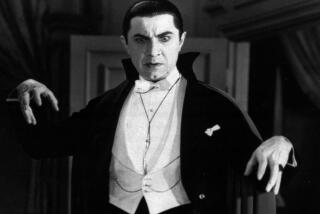BOOK REVIEW : Comic Relief for Scar-Crossed Characters : SCAR LOVER <i> by Harry Crews</i> ; Poseidon Press; $19; 267 pages
About a third of the way into Harry Crews’ new novel, “Scar Lover,” Pete Butcher reports to his job at a paper company in Jacksonville, Fla., only to find that he’s been fired. Pete hardly cares and, with nothing to do for the rest of the day, he decides to buy a harmonica.
He takes it home to his boardinghouse, lies down on his bed and, in trying to play the instrument, finds himself fascinated by the idea that “every single tune in the world was in there somewhere.” Yes, Pete thinks, he has made a great investment; “it was all in there if he could just find it.”
Pete, judged by this scene, would appear to be a searcher, but in fact that’s an aspect of his personality he would rather expunge. Pete has long since given up looking for answers because he has done something he considers beyond forgiveness: He has destroyed his family.
It was a terrible accident--Pete didn’t know his little brother Jon was standing behind him, right at his shoulder, when he put the hammer into its backswing--but Pete feels responsible for everything that followed his millisecond of inattention; Jon’s brain damage, the medical bills that indirectly killed the brothers’ parents, Jon’s subsequent institutionalization. Pete just drifts through life, not so much hopeless as resigned to an exacting fate.
This is weighty material, obviously, but Harry Crews brings to his novels an amiability and wit that make his work nearly comic, regardless of subject matter.
In “Scar Lover,” the humor derives mostly from Pete’s being drawn into the lives of the family next door despite his efforts to remain at arm’s length, beyond further loss.
First Pete meets Sarah Leemer, a shy woman who seeks company because her mother has just been taken to the hospital with cancer; then Henry, her father, a quiet, self-sufficient man for whom Pete is soon working; and Gertrude, her mother, an ornery, foul-mouthed, half-crazed woman whom Pete begins to admire in spite of himself. When Henry dies cutting wood in the back yard, Pete unexpectedly becomes the man of the family and eventually finds that he is capable, this time, of living up to responsibility.
Pete’s path isn’t particularly novel literary fare, but one thing that involves the reader in “Scar Lover” is Pete’s reluctance to walk that path. He’s a tough guy, always cursing, always ready to work hard and drink hard, but everyone he falls in with in Florida proves more than a match from him. The Leemers are stronger in spirit than Pete first imagines, and so are the two people who brought Pete and the Leemers together, Max and Linga.
Max, an 85-year-old boardinghouse busybody, has done so by spreading Pete’s story everywhere, making him the object of curiosity and pity; Linga, an elaborately, ritually tattooed Rastafarian, did so by using Pete (who worked with Linga’s husband) to get to Henry Leemer’s life insurance. The subplots involving Max and Linga seem largely diversionary, in spite of their intricate development, but they do provide Crews with the opportunity to write some funny, spooky scenes.
Those scenes, in turn, allow Crews to elaborate on the novel’s main theme without getting overly solemn. Max, who prides himself on being fit, trim and alert despite his advanced age, seems to have led a life so completely devoid of tragedy that Pete feels compelled, at one point, to throw him into the alligator pond at the local zoo. Linga, whose face is a living ritual scar, is an example of how the ability to withstand pain, and inflict it, can give one power over others.
Linga goes so far as to say scars are beautiful, because a scar “always means the hurt is over, the wound is closed and healed, done with.” It’s a compelling thought, although Pete, still living with emotional scars, totally disagrees.
“Scar Lover” doesn’t really earn its happy ending, which not only leaves Pete with his new family but also reunites him with part of his old one, when Jon is miraculously found and returned. It’s all a bit too neat, a bit too sweet, a bit too movie-like. But few readers will resist this fortunate outcome, for all that, because it isn’t the result of answered prayers; Pete, at bottom, just got lucky. His chance for happiness at the end of the book is simply another twist of fate, no more his doing than the hammer blow that caused his troubles in the first place.
Next: Carolyn See reviews “The Training Ground” by Siegfried Lenz (Henry Holt).
More to Read
Sign up for our Book Club newsletter
Get the latest news, events and more from the Los Angeles Times Book Club, and help us get L.A. reading and talking.
You may occasionally receive promotional content from the Los Angeles Times.









